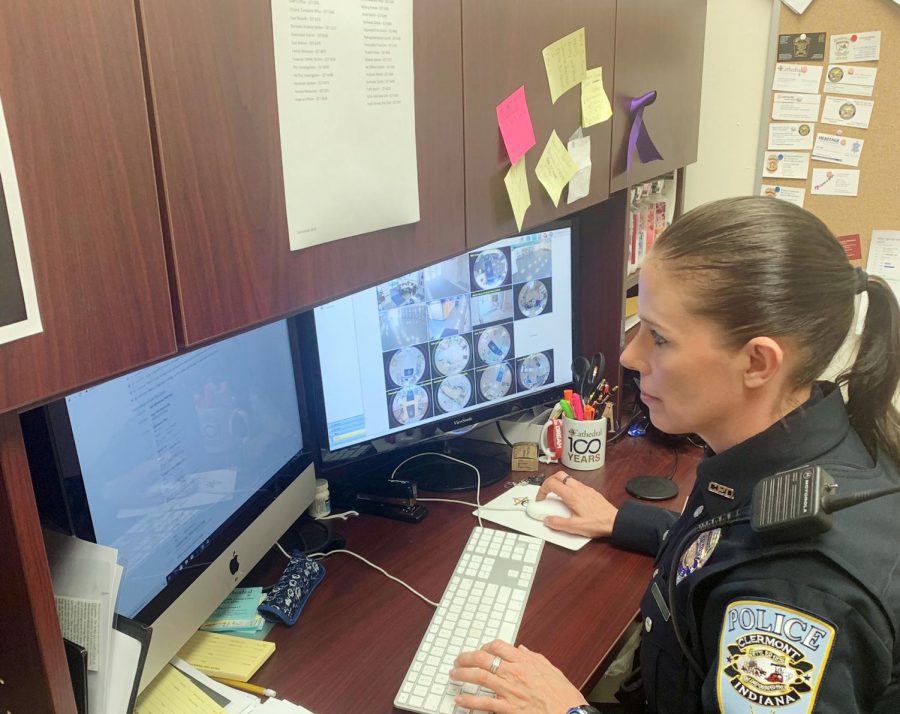SRO offers spring break safety tips
Use your phone as a security device, among other tips
Student Resource Officer Ms. Tabetha Emenaker works in her office.
The following is a slightly edited transcription of a Q and A with Student Resource Officer Ms. Tabetha Emenaker conducted by Ava Amos regarding student safety locally and overseas during vacation.
How should students take precaution when approached by a person they do not know on spring break?
Do not leave and go any place with that person, especially not in a motor vehicle. If possible always have at least one other person with you at all times that came with you on spring break. Watch for strangers that operate in groups (two or more people).
If a stranger is up to no good, most often one of them will distract you and your friends, while the other strangers steal things from you while you are not aware. You may not even be aware that they have others waiting for you to be distracted and they move in and take your things.
Always have your GPS in on mode on your cell phone and have a charging cord and one of those mobile charging batteries just in case. Let someone that you know who is not going with you know where you are going (mall, name of beach, club, etc.). Under no circumstance give any stranger a ride, not even to another public place. You do not know that person and they can pose a risk to your safety.
What should students know about the Lifeline Law?
This law and similar acts were enacted to protect from liability of those who seek medical attention as a result of illegal actions.
The Lifeline Law was created to reduce the number of persons’ deaths related to drugs, alcohol, and other factors. This is a law pertaining to the state of Indiana. Other states may not have that law, but have similar ones referred to as medical amnesty policies.
To enact the law when reporting a medical emergency due to illegal activity, you must do the following: Provide full name and any other relevant information when a law enforcement officer requests it; remain on the scene until law enforcement and medical emergency medical assistance dismiss; cooperate with authorities.
Last, this law does not interfere with law enforcement procedures or limits the ability to prosecute for other criminal offenses such as providing alcohol to minors or the possession of a controlled substance. There are different types of amnesty under these laws. They are the following: Individual, victim, caller and organization amnesty.
What concerns do you have about students going out of the country on spring break?
Prior to making any arrangements to fly out of the country, make sure that there are no current travel bans or travel cautions due to increase in crimes. At this time there is a caution in place for people wanting to visit Mexico and the Bahamas due to crime increase.
The number of carjackings, assaults and robberies have increased in those countries lately. If you do travel outside the country, make sure you always have another person with you at all times when you leave your hotel or home rental.
Make sure your cell phone GPS is on and tell someone other than the person that is going out with you where you are going. Do not get into cars with strangers and do not bring any strangers with you in your vehicle or to the place you are staying. If they know the place you are staying they can watch you at a different time, and when you leave they may break in and steal your belongings. I also suggest taking a picture of your identification card (front and back). Email it to yourself. This is just in case if yours gets stolen so you at least have a way to pull up your own ID picture and information.
Also, be aware that human trafficking is a very common and serious problem. There are several types of human trafficking. They are slave labor, sex trafficking and organ trafficking. It is estimated that approximately 300,000 children, women and men are trafficked a year.
Human trafficking is a $32 billion industry worldwide. Human trafficking does not discriminate. It doesn’t matter your race, income, age or gender. Anyone can easily become a victim of human trafficking. While I was on vacation in Florida, I observed three individuals actively seeking more victims for human trafficking. I have had some training on how to spot it and how to interact with victims of it.
This is one of the many important reasons that you do not interact with a stranger or leave with them anywhere.
What do students need to know about their rights as a U.S. citizen should they be detained?
Prior to traveling out of the country make sure to visit the website Travel.State.Gov. and refer to “Under Arrest or Detention of a U.S. Citizen Abroad.” On that page you can look up laws of other countries and the local U.S. embassy there. Program into your cell phone just in case.
The first thing to remember upon any arrest outside of the U.S., make sure you tell the authorities that you want the local U.S. Embassy notified of your arrest and location of incarceration. When outside of the U.S. you are bound by that country’s laws.
What should a student do if they are arrested?
If you are in the U.S. or in another country, make sure to cooperate with the authorities. If you are asked any questions that are self-incriminating nature, you do not have to answer unless you have an attorney present. If is a question that a life depends on at that moment, answer it.
You can claim amnesty under the Medical Amnesty Policy if in the U.S. (if the person is under some sort of chemical influence). You do not want to risk another person’s life. If you are a minor, you cannot be questioned without your parent present, unless a life is at risk.
If you are outside the country, the laws may be different pertaining to the arrest and detaining procedures of juveniles. Make sure you do research prior to going to that country.
How should students act in other countries with a lower drinking age?
Your body at a young age will react differently than if you were an adult age. This is why the U.S. has chosen to have the drinking age of 21. If you are not a “regular” drinker, which you shouldn’t be as teenagers, you must remember that drinking alcohol when your body isn’t use to it can cause behavior and neurological change very quickly.
Any person that drinks so much alcohol to the point of vomiting should realize that it is your body’s way of keeping you from having alcohol poisoning. People can die from alcohol poisoning. So to get to the point, if you choose to drink alcohol be a responsible drinker in other countries if they have a lower drinking age limit.
How should students get help in case of an emergency?
Make sure that you know and program into your cell phone the emergency numbers for your local law enforcement (in the U.S. it’s easy, 911). If you go out of the country, make sure you know their numbers to emergency services.
If a student is in a dangerous situation, such as around unfamiliar people, what would be the best way to navigate?
Always have a charged cell phone and your GPS turned on. Do not get into a car with someone you don’t know. Make sure you have enough cash/means of payment to get a ride out of there.
Know the numbers to cab companies for the place you are visiting. If you are in a place that you feel uncomfortable, leave and call someone to get you. Always try to be with at least one other person you know that came with you on vacation.
Are there any specific safety concerns that students going out of the country during spring break should take? If so, what?
Always have a charged cell and the GPS on, have your identification with you at all times when going out, always use the buddy system, have someone with you at all times that came with you on vacation.
Make sure that your group tells someone that is not going with you where you are going and when to expect you back, make. If a stranger tries to hang with your group, ditch the stranger. People with bad intentions don’t like a tracking element. Do not bring strangers back to the place you are staying, don’t take drinks from strangers and watch your drink at all times.
If you leave your drink for a moment, don’t come back and drink from it, get a new one.

Ava Amos is a senior and is the co-editor-in-chief of the Megaphone staff. She is a member of the varsity softball team and enjoys volunteering with the...







